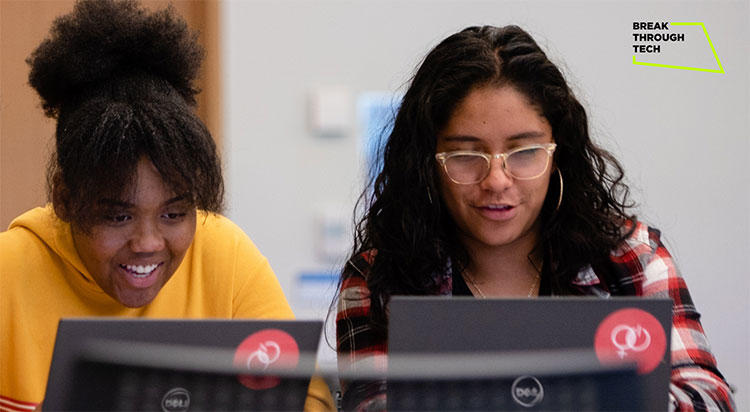Topics

“Women represent 57 percent of all bachelor’s recipients in the U.S. but only 19 percent of CS graduates,” said Sanjeev Setia, proposed School of Computing Division Dean. “For social equity and inclusion, it is imperative that we work towards gender parity in the technology sector.”
George Mason University received a grant from Break Through Tech to propel more students who identify as women and non-binary into tech education—and ultimately tech careers—through curriculum innovation, career access, and community building.
The grant’s goal is to increase the number of these students graduating with a tech degree at Mason by 12.5 percentage points by 2026.
Mason’s Break Through Tech program will be directed by the Volgenau School of Engineering, the proposed School of Computing, and the Departments of Computer Science and Information Sciences and Technology.
The faculty working on this initiative seek to attract and retain women and underrepresented communities pursuing computing degrees and careers in tech in the D.C. metropolitan area.
Mason’s Break Through Tech program will include:
-
A summer program for rising first-year students designed to ignite interest in tech by teaching them how to code mission-driven, real-world applications;
-
A new, innovative introductory sequence of computing courses;
-
A paid, three-week mini-internship program called a “Sprinternship®” that gives first- and second-year students a resume credential and real-world experience to make them more competitive when applying for a paid summer tech internship;
-
A networked cohort of individuals who identify as women and non-binary—both peer-to-peer and student-to-professional—in the D.C. metro area to support, engage and motivate one another.
“We are very excited about the opportunities this grant provides for curriculum innovation and industry partnerships that will strengthen our ability to recruit, train, and incorporate more women as successful professionals to the computing disciplines,” said Ozlem Uzuner, chair of the Department of Information Sciences and Technology. “This project will have a lasting positive impact in terms of improving diversity in the workplace, and we are well-positioned to make our mark.”
Department of Computer Science Chair David Rosenblum echoes the importance of curriculum innovation. Notably, adjusting the introductory computing courses offered at Mason.
“An increasing number of institutions, most notably Harvey Mudd College, have experienced tremendous success in attracting female students into their computing programs, through innovations to the design and content of their introductory computing courses,” said Rosenblum. “At Mason, we will apply the best practices that have been established by these pioneering institutions while introducing homegrown innovations of our own.”
Huzefa Rangwala, a professor in the Department of Computer Science and principal investigator for the grant, said that in addition to revamping Mason’s introductory computing course, a free “bootcamp” will be offered over the Summer to prepare students for the course.
“By 2026, estimates are that the U.S. will only be producing 17 percent of the graduates needed to meet the nation’s tech workforce needs. This is a national problem,” said Rangwala.
Break Through Tech at Mason is purposefully working to ensure long-term tech success for the program participants through community building efforts. Volgenau School of Engineering’s Chief Diversity Officer Christopher Carr says Mason is taking a holistic approach.
“From our K-12 outreach, we will utilize structures like our Early Identification Program, which works with communities across the National Capital Region, with particular emphasis on those communities that have been historically oppressed and marginalized,” says Carr. “We will then ensure that all participants have support through not only mentorship and cohort development, but by intentional efforts to connect the participants to all that is Mason - from our student organizations to living-learning communities, and so much more.”
